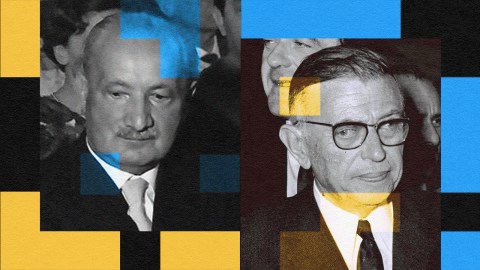How to be authentic at work by exploring “Dasein”

- So much of our lives involve a degree of performance. For existentialists like Jean-Paul Sartre, this can be a bad thing.
- Martin Heidegger’s idea of Dasein is about self-defined targets and identifying with a role. It can help avoid Sartre’s problem.
- We look at three ways to be more authentic at work.
In his 1944 book, Homo Ludens, the Dutch philosopher and historian Johan Huizinga presents a curious argument: humans are defined by our ability to make and play games. Huizinga’s book deliberately casts our ability to play (ludens) as both more widespread and definitive than our rationality (sapiens). Over the course of several hundred pages, Huizinga provides example after example of humans creating games. We invent certain rules that apply in certain spaces. We have actors, often in costumes, who read lines and will act out or enforce those rules. True, there may not be a ludic quality to these games — few people might be laughing in a court of law or a high school classroom — but they’re games nonetheless.
Huizinga’s Homo Ludens presents a case for what he thought was a descriptive account of a sociological and historical fact. In the years after his book, philosophers across the world agreed with him. Jean-Paul Sartre, in his magnum opus Being and Nothingness, highlighted the performative aspect of everyday life. This is most obvious in our workplace. “[The worker’s] condition,” Sartre writes, “is wholly one of ceremony. The public demands of them that they realize it as a ceremony; there is the dance of the grocer, of the tailor, of the auctioneer.” For Sartre, so much of modern society is pretense and theater. It’s what he calls “bad faith.”

People enjoy reading Sartre because they often find themselves nodding along. The theater or game of it is obvious with only a little rewording. We wear “work clothes” as costumes. We have HR documents as rule sheets. We have job titles as character roles. Work is an act. And so, people will also nod along with Sartre’s protestations of “bad faith.” They will agree that this is a bad thing — it’s inauthentic, damaging, and stifling. We spend more days at work than at leisure, and so the majority of our lives are lies.
How, then, can we live authentically at work? How can we hope to square performance with honesty?
Where are you going?
Sartre’s philosophy was deeply inspired by the German phenomenologist Martin Heidegger. In fact, Being and Nothingness was an obvious homage to Heidegger’s own, Being and Time. Where Sartre talked about bad faith and the idea of “transcendence” (self-creation), Heidegger preferred the term “Dasein.” Dasein is our sense of being in the world. In one sense, this “being” is the place, time, and headspace you are in right now. It is the “thrownness” of who you are. You have been thrown into the 21st Century, in a certain country, with a certain body, and with certain values. But, more importantly, being and Dasein are defined more by your becoming. You are defined not by where you are now, but by where you are going. Your life is given meaning by what you are called to do.
And called by whom? By God? By your parents? By societal expectations? By your boss? No, Dasein is what you call yourself to do.
As far as I know, Heidegger was not intending to offend Newtonian physics nor invite some time-travel paradox. He did not imagine some future version of you was pulling the fatalistic string of you. But, in a way, in some imagined future, you act as the target at which you aim. Dasein is the setting of a goal and walking towards it. Everything I do is, as Heidegger puts it, “for-the-sake-of” Dasein. I play with my kids and kiss them goodnight for the sake of being a father. I put on my sports shoes and get a sweat on, for the sake of being a runner. I put on a tie, carry a business card, and talk in anodyne pleasantries for the sake of being a lawyer.
For Heidegger, at least, there is nothing inauthentic about a role or about playing a game. So long as it’s the game you’ve chosen.
Authentic working
How, then, are we to walk the perilous line between “bad faith” and Dasein? How can we happily accept our role while avoiding the trappings of pretense? Here are three ways to bring Dasein to your workplace.
Find your role. If you work for a medium-to-large company, there’s a good chance you can “move around” within your organization. A 2020 study showed that employees who made a “lateral move” within their company were much more likely to stay than those who didn’t. Internal mobility makes employees happier. Talk to people around you and ask them questions about what they do. Watch other people’s work and learn how they do it. Speak to your line manager about your ambitions and targets. Find the “for the sake of” that makes you want to work.
Embrace your work identity. Ultimately, the difference between authentic and inauthentic life can be found in how you frame your situation. Sartre would say it’s all about radical freedom and choosing a path. The tension of bad faith is when you feel your work identity is drastically different from your “real” identity or that you don’t like your work identity. Both the employee and employer can change this. An employer can be more open and confident in their mission statement. Tell the world what your values are as a company. There is good evidence to show that a good mission statement, which references employees often, can make people more productive and feel a sense of work-life balance. Likewise, an employee can see the good in their work. They can take pride in the lives changed or happiness given. Re-read a grateful email, celebrate company-wide success, and congratulate yourself for doing something well.
Break down the barriers. It is naïve to assume there will be no work-life vs. home-life identity clash. Sartre is right about that one — every job, every interaction, involves an element of “ceremony.” But that doesn’t mean you can’t bring more of yourself to your work. Over on Big Think+, communication expert and author of The Connector’s Advantage, Michelle Tillis Lederman, gives us some great advice about being authentic at work. “The definition that I’ve come up with,” Tillis Lederman tells Big Think+, “is that authenticity is showing up open and infusing into your interactions the attributes of yourself that you value the most.” Lederman walks us through how we establish our own values and how we can bring those to our work.





